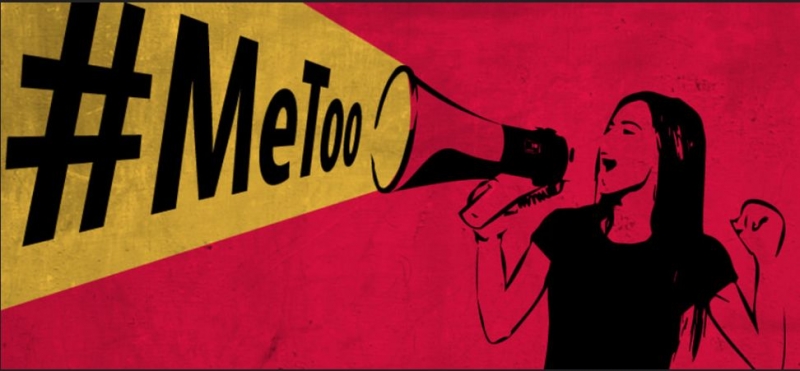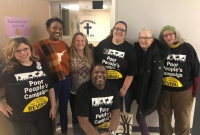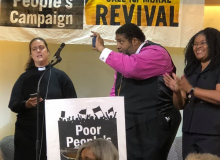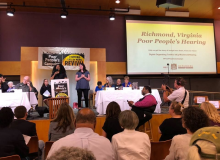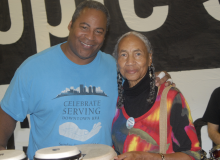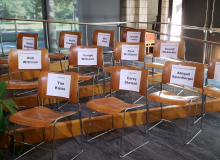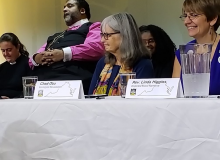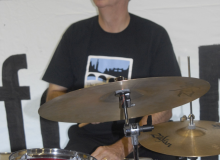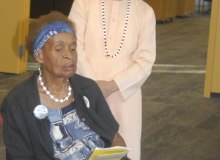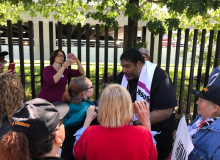Perhaps it sounds like I am describing The Handmaid’s Tale, the classic dystopian novel by Margaret Atwood that was recently turned into an award-winning, bingeworthy, and positively chilling TV series. In truth, however, world I am describing is actually the source material of The Handmaid’s Tale, the world of the biblical patriarchs, the world we read about in today’s Torah portion.
On the surface, the biblical tale of our patriarchs is just as disturbing as its modern-day adaptation. In Genesis chapter 12, God promises Abraham that his progeny would become a great nation. Unfortunately, Abraham’s wife, Sarah, is unable to conceive. So, Sarah suggests that Abraham have a child with her Egyptian handmaid, Hagar.
When Hagar becomes pregnant, Sarah begins to feel insecure about her own status. She grows abusive toward Hagar, and Hagar runs away. In her flight, Hagar is approached by an angel — she, an Egyptian slave, is in fact the first woman in the Torah to be approached by an angel. The angel tells her to return to Abraham’s household, promising her that her child will become the father of a great nation. Before she heads back on the road, Hagar gives a name to the God who appeared to her in the midst of her distress, “El Ro’i,” “God Who Sees Me,” and in so doing she becomes the first woman in the Torah to come up with a name for God. Hagar gives birth to Ishmael soon after returning, and Abraham raises the boy as his own and only son.
Matters take a dramatic turn when an angel tells Abraham and Sarah, now quite elderly, that they would finally have a child. Sarah conceives and gives birth to a son whom she names Isaac, meaning laughter, because of her own joy, and the joy she imagines others will feel when they learn of this miracle.
That joy, however, turns quickly to fear and loathing, as Sarah begins to worry that Ishmael poses a threat to Isaac’s birthright and status. So she asks Abraham to send Hagar and Ishmael away.
Abraham is distressed by the request, but reluctantly agrees after God tells him, “Everything Sarah says to you, listen to her voice,” which he takes to mean figuratively as “Do as she tells you.” Abraham sends Hagar and Ishmael away with insufficient food and water. As the two nearly die in the desert, God intervenes, offering Hagar comfort and hope, and opening her eyes so that she could see a nearby well of water. Ishmael survives and grows into the destiny God had promised. The story concludes with Hagar choosing a wife for her son.
Though women are the main characters in the story, they exist in a world where they are seen as objects — worthy only for their reproductive capacity, their contributions to the household, or their relative value to the reputation and legacy of men — and are always, always, subject to the dominion and decisions of men. Sarah urges Abraham to have a child with her handmaid because in this way she will be able to consider the child her own and thus be of value to her husband. We’re not told whether Hagar is given a choice about conceiving a child with Abraham. Sarah sees Hagar as a threat to her esteem in Abraham’s eyes and so forces her to flee. Sarah only feels worthy when she has a child of her own and then immediately feels insecure about her and her son’s status relative to the status of Hagar and Ishmael in the eyes of the patriarch. Abraham unilaterally makes all the family decisions.
This is not a world of equality or partnership between men and women. It is a world in which women do not have control of their own bodies, much less their lives. It is a world in which biological sex and function are inextricably linked to gender roles and norms, which in turn are rigid and strictly enforced. One’s value is derived by how closely one conforms to the gender role that he or she has been assigned. And, for the most part, it is a world in which women are invisible to men, except in moments when women are useful or problematic.
The impact of such a world on the people who live in it is painful and tragic. There is much suffering by women, especially by women of a lower status, and there is even suffering by men who are expected to uphold this culture of dominance.
Our world today is of course quite different from that of the matriarchs and patriarchs. But in some respects we are still enslaved to the same patriarchal dynamics that caused our biblical ancestors so much suffering. If we remain stuck in the same patterns of thinking and acting, beholden to the same attitudes and systems and cultures of dominance, we will similarly be unable to fully flourish.
To be sure, the modern era has heralded a great deal of progress. In particular, the status and role of women in the US has improved considerably over the past several decades, a testament to great efforts and sacrifices from women and men who have worked fiercely and tirelessly for justice.
But it’s easy to let that progress obscure what we have yet to achieve, and to distract us from the reality that these advances are fragile and constantly under siege by those who long for the way things used to be.
As someone who was born in the early 1980’s, when many of the battles fought by women and male allies over the last century had already been won, and as a straight, cisgender, white male largely unaware that my skin color, biology, and sexual orientation afforded me unique privileges, power, and status, I went through my life mostly oblivious to the many ways in which it is still much, much harder to be a woman in our society than a man, especially if you are a woman of color, or in some way don’t conform to stereotypes about how women are supposed to behave.
I didn’t notice, for example, how social and cultural cues made girls and women feel that if they didn’t look or act certain ways, they had less value. I didn’t notice how girls’ opinions and concerns seemed to matter less than those of boys. I didn’t notice how women had to work twice as hard as men — and endure double the abuse for a fraction of the pay — to attain the same levels of professional success. I didn’t notice how a government disproportionately dominated by men “takes women as objects of concern” but rarely sees them as equal partners in shaping policy (Judith Hauptmann, Standing Again at Sinai).
And, in my Jewish world, I didn’t notice how women were frequently marginalized or excluded from their own religious tradition, whether because God is mostly referred to in masculine language, or because the tradition gives preferential status to male characters and voices, or because the roles and practices of men and women within much of the Jewish world are not only different but self-evidently unequal, or because, even within liberal denominations, there are far more male than female rabbis and cantors, and women are typically seen as subjects of Jewish tradition rather than coauthors.
I have been privileged in my adult life to have incredible women role-models who have helped me lift this veil of ignorance, to see the world through their eyes, their experience, and their learning. And having a daughter has made me even more sensitive to these realities and passionate about helping build a different world for all our daughters to grow up in and inherit.
Over time, I have come to see that there is a lot of pressure in our society for girls to be submissive and boys to be dominant, that girls are criticized for speaking out and boys chastised for crying, that women are punished for their sexuality while men are rewarded (Barack Obama, “This Is What a Feminist Looks Like“).
I have noticed that I am simultaneously congratulated for being a present father and criticized for spending too much time at home, while at the same time Adira’s role as a mother is taken for granted and her professional work denigrated because it takes her away from the kids.
I have seen Lilah’s male classmates praised for being confident, competitive, and ambitious, while Lilah and her female friends are chastised as being “bossy” for exhibiting those very same traits.
And I have seen how a prominent man can boast about committing sexual assault, and even when it is caught on tape, millions can dismiss it as mere “locker room talk” and not see it as morally disqualifying in a candidate for President of the United States.
Even so, I will admit that it was not until the past year that I truly became awake. Last fall, The New York Times broke the Harvey Weinstein story. In the weeks that followed, similar accusations surfaced against many other prominent and powerful men in industries ranging from politics to food service, from high tech to hospitality, from academia to agriculture. Some of these revelations hit close to home, exposing abusive behavior in the Jewish community — even, sadly, within organizations, like USY, that were so pivotal to my own Jewish upbringing.
Around the same time, hundreds of thousands — perhaps millions — of women, including many who I consider close friends, took to social media to tell their own stories of sexual harassment, abuse, assault, and rape, using the hashtag #MeToo.
I’m ashamed to admit that it took reading and listening to those stories to open my eyes to what my privilege had blinded me to for most of my life. It revealed to me the likelihood that nearly every woman had her own “Me Too” story. Just as troubling, it revealed that nearly every man was likely either the perpetrator or the enabler of — or at the very least a passive bystander during — some woman’s “Me Too” experience. It devastated me to consider that the women in my life most likely had “Me Too” stories of their own, and it terrified me to think about the fact that, if nothing were to change, my daughter might also have her own “Me Too” story to tell one day.
Most discomfiting was the recognition that I was complicit in all this, too. The #MeToo movement caused me to look honestly at my own past behavior, especially from when I was in high school and college. Whether it was participating in sharing jokes that I didn’t realize at the time were inappropriate, or commenting on women’s appearances, or mindlessly objectifying women, I could now shamefully see how my regretful behavior in the past may at times have crossed boundaries, created discomfort, caused pain, or left scars. I could now see ways in which I tolerated, enabled, or even contributed to a toxicculture among my male friends, classmates, and colleagues. Of course, there is a spectrum of bad behavior being called out by the #MeToo movement, from inappropriate jokes to rape, from being a bystander to being a serial offender, and the distinctions between those deeds are meaningful and worth preserving. But at the same time, one does not have to be Harvey Weinstein or Bill Cosby to be guilty of perpetuating a toxic culture that harms everyone, in ways large and small, and that empowers the worst among us to feel they can do whatever they want, to whomever they want.
Yes, my friends, so many of us, myself included, have a lot of teshuvah to do, so that nobody will ever have to say ‘Me too’ again, so that we can heal what is sick in our culture, and so that all our sons and daughters have an equal opportunity to thrive.
The prophet Isaiah wrote, “let the wicked give up his ways, the sinful man his designs, and let him turn back to the Holy One…For, declares the Holy One, My plans are not your plans, nor are My ways your ways.” (55:7-8). This day invites us to see our destructive patterns of thoughts and behavior and turn ourselves toward living lives more aligned with a God who thinks and acts differently.
In today’s Torah portion, almost every character in the story plays the roles one would expect of them within their patriarchal world. But God’s plans are not our plans, and God’s ways are not our ways. As is God’s nature, God’s words and actions in this story defy what we might have expected.
Our Torah portion opens with the phrase, “Va-Adonai pakad et Sarah,” often translated as, “God remembered Sarah.” But note that here the Torah doesn’t use the more common word for remember, zokher. Rather, it chooses the word pakad, a verb that is pregnant with meaning. Pakad is a more active and intimate verb than mere remembering. Va-Adonai pakad et Sarah means that God turned God’s undivided attention to Sarah, that God attended to Sarah’s needs and desires, that God visited Sarah graciously. We are being told here that God sees and hears Sarah, in the fullness of her humanity, in the depths of her desire and need. God here has listened to Sarah’s prayers, has taken her concerns seriously, and has been moved by them.
Contrast this with Abraham, who does not even seem to give Sarah the time of day when their baby is born. He doesn’t speak with her, doesn’t interact with her, and doesn’t celebrate with her. The only time Abraham engages with Sarah is when she asks him to expel Hagar and Ishmael. But even here, Abraham doesn’t say a word to her. He is unconcerned with both Sarah and Hagar’s feelings. He is distressed according to the text only because the matter “concerned a son of his” (Gen. 21:11).
God, on the other hand, tells Abraham, “shema b’kola,” listen to her voice. Listen, God says, to what Sarah is saying to you. Believe her pain. It’s real to her, even if it doesn’t feel as real to you or has implications that are uncomfortable to you. Don’t trivialize her concerns. See her in the fullness of her humanity, as your equal, as someone as deserving of attention, of concern, and of being heard as you are.
And while God’s directive to Abraham to “listen to her voice” is traditionally taken to mean “do as she says,” that’s not the only way to understand what God is saying here. Rather, as modern feminist scholar Marsha Pravder Mirkin points out, there is
[A] world of difference between ‘listening to her voice’ and ‘obeying.’ Sarah was distraught, she was lonely, she was frightened. She needed Abraham to empathize with her feelings, to listen to her feelings…Sarah needed Abraham to sit there in empathy. She did not need him to take action, nor do we need to hear God’s words as a request that Abraham take action…I believe God was saying, ‘Listen to Sarah, hear her feelings, be empathic with Sarah. Let her know there’s no reason to compete, there’s room enough for both boys to grow up with My blessings.’ Abraham, instead, acted. He didn’t listen or question.
He simply sent Hagar and Ishmael into the wilderness to die.
God’s next action in the story is hearing Ishmael’s cries. God, again, acts as the God that Hagar once called, “The God Who Sees Me.” God here is the One who sees and hears all, the One in whose eyes no one, regardless of race, class, or gender, is invisible. God even hears the cries of a half-slave boy whom the story’s narrator does not even tell us is crying in the first place! In other words, no one is voiceless before our God.
Then, God comforts Hagar in her distress, and empowers her to take her destiny into her own hands: telling her to take her son in her arms, opening her eyes so that she could see a nearby well, and then observing her proudly as she nourishes Ishmael back to health.
The final thing God does in this story is accompany Ishmael as he grows up, again reminding us that God sees, is concerned with, and is present even and especially for the marginalized.
The story concludes with Hagar —a character with the compounded burdens of being a woman and a foreigner and a slave, a woman who had been abused and dominated — empowered and embracing her independence, defying her society’s norms by choosing a wife for Ishmael. In fact, Hagar is the only woman in the Bible ever to do such a thing. One could even argue that, as the final curtain falls in the drama, Hagar is the story’s hero, a model the Torah holds up for us of strength, resilience, justice, and liberation.
This, then, is a story about how ours is a God for whom no person — regardless of gender, race, or class — is ever invisible, about how all people are infinitely and equally worthy in God’s eyes, and therefore about how social systems in which men and women are functionally unequal — are ungodly. It is a narrative that calls upon us to emulate a God who sees and hears everyone, and to whom everyone equally matters.
This Holy Day thus asks of us to to stop behaviors that passively reinforce the marginality and invisibility of women. In the Jewish community, for example, that means paying closer attention to the language we use to refer to God, choosing instead gender-neutral terms, or alternating between masculine and feminine terminology and imagery. It also means elevating and celebrating the voices and stories of Jewish women to equal the central role we give to male figures. And it means creating space for women in our community to defy traditional Jewish gender norms, fully embracing their equality by wearing kippot, talitot, and tefillin, teaching and preaching, reading Torah and haftarah, and leading services.
Additionally, this Holy Day asks of us to nurture environments — at home, in our schools, in our workplaces, online, and in the public square — where everyone feels fully respected; where no one is ever made to feel uncomfortable or threatened; where sexual harassment, abuse, and assault is never tolerated; where offenses can be reported without fear of retribution; where concerns and complaints are believed; and where the victim is never blamed or shamed. It means we must speak up when we hear things that demean and marginalize, speak out against policies that rob women of control over their own lives and bodies, and advocate for policies that advance equality.
It asks of us to pay attention to how we reinforce outdated, inflexible, and harmful norms of gender and sexuality, and instead enable each other — and especially our children — to simply be ourselves.
It asks of us to search our hearts for and uproot the unconscious biases that cause us to discriminate against women, to insist that women’s ideas and opinions are always taken as seriously as men’s, and to demand that women’s voices are always listened to with the same attentiveness given to the voices of men. And it asks of us to refuse to see anyone as an object, to minimize or ignore anothers’ pain, or to use anyone as a means to our own ends, instead treating everyone as the sacred reflection of the Divine Image that they are.
It means, finally, building a community and a society where women don’t have to work twice as hard, accept lower wages, and endure abuse to succeed, a world in which all of our daughters can know that they can be truly anything they want to be.
According to tradition, on Rosh Hashanah all of humanity passes before God as sheep pass before a shepherd (Mishnah, Rosh Hashanah 1:2). No lamb is insignificant; no ewe is invisible. Every one is seen, every one is accounted for, every one is attended to, every one matters, every one is equal in God’s eyes. We, for our part, are called upon to search our hearts and probe our histories to discern whether we have acted in a way that reflects this reality from God’s perspective. Do we see everyone, or are there people invisible to us? Do we hear everyone, or are there voices we trivialize? Do we treat everyone as though they matter, or are there some we see as less significant than others? This, then, is our teshuvahon this Rosh Hashanah: to stand before a God who sees and hears everyone and, this year, to recommit ourselves to God’s call, echoed in today’s Torah portion: “Listen to HER voice!”
Rosh Hashanah, Day 1, 5779 (September 10, 2018)
Temple Beth-El, Richmond, Virginia
Link to original article from Rabbi Michael Rose Knopf
